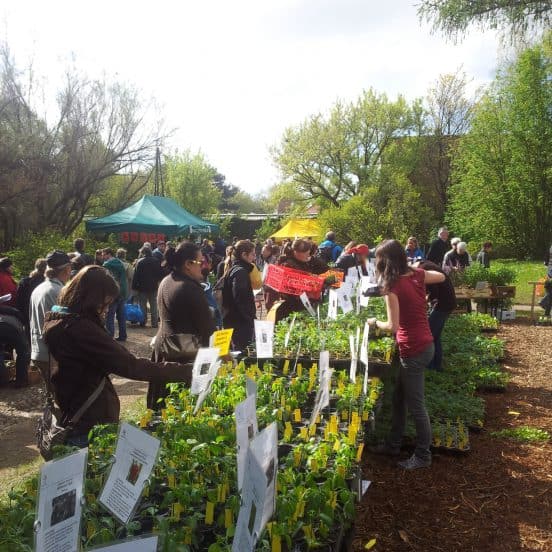A new season’s also starting for the plant sales, and once again I’m working as the peppers expert for Arche Noah (Noah’s Ark, Austria’s Native Seeds/Search). First appearance, last weekend at the rare plants sale in the Vienna Botanical Garden. It was full of experiences, old and new, as usual.

Oldie but goodie: the diversity of people looking for plants is just fantastic. Old and young, experienced and green behind the ears (if not necessarily the thumb), fashionable and old-style. Supermarkets and their standard fare may be dominant, but the interest in old varieties and good foods, grown in the private garden, or on the balcony (or even indoors – there were quite many inquiries about that), is pretty great.
My favorites this year were the young men who were dressed in Americana-style T-shirts, wearing baseball caps and sporting full beards… and pulling a handcart for their plant purchases. Full-on hipster…
The favorite on the negative side was the woman who insisted on wanting “hot chilli” but not “hot peppers” because the former would burn only once, but the latter twice. Never mind that this differentiation makes just about no sense at all, that a truly hot pepper/chilli can easily burn three times, that individual reactions to pungency can differ a lot… No, she just knew it all, and knew it better, and every human being’s digestion is clearly the same, and my more than 10 years of studying these things just couldn’t hold water to her convictions.
Talking of such aggravating contexts, the search for “green paprika” was on again this year, of course. And with a lot of disappointment, because the pictures used to illustrate the different varieties just didn’t show the green paprika that those people were looking for, hence there couldn’t possibly have been any. (Of course, the photos are of the ripe pods, since it’s their color that matters much more.)
At least, this old drag only came out as it got later during this event, as people who haven’t immersed themselves in the matter as much arrived.
I had never before noticed – and it is probably all due to my recent reading – to what extent such convictions are para-scientific. That is, whether it’s the hot chilli vs. hot paprika or the varieties that just aren’t green paprika since there are photos of red or yellow pods, the background for those convictions is laid by experiences and pieces of knowledge that the person in question gained from his/her everyday life, and thus uses to draw conclusions. Wrong ones, perhaps, but that’s not easy to notice (and hard to convince a person of).
A counter-example, wonderfully fitting for the theme of green chilli (or is that hot green peppers? ;) ):
A couple I already know from last year came by again this year. Again on the first day, while the selection and the amounts available are still great. And again, they only came for Pimientos de Padrón – but a full 20 plants of them. As they had last year, and harvested – what was it again? – 2000 pods from.
I have to admit, should I buy chilli plants at such a market, I’d also want to get more varieties and fewer plants each, like just about all people do… but their way is much more sensible if one actually wants to have a harvest and not just a little insight into what different food plants look like. (It’s also what my own growing has shifted to being like.)
Fertility was, after a fashion, a big theme at this event: Never before did I hear so many complaints about chile pepper seeds that failed to germinate or plants that grew well last year, but didn’t produce. A diagnosis from afar is more than difficult, of course, but this does, at least, serve as a good reminder for the continuing need to educate about seed and plant purchases, seeding and growing. Especially considering that some of the plants on offer suffered from a viral infection (which the plants usually grow out of, but still…), but only very few visitors/customers noticed.
The plants got sold, anyways…


Leave a Reply
You must be logged in to post a comment.